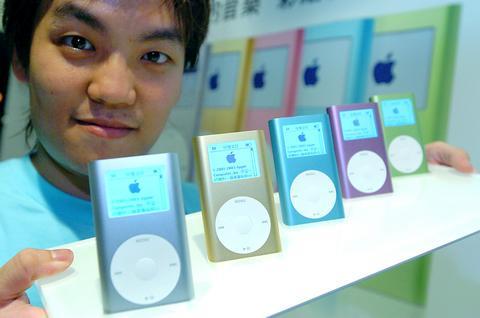Music lovers and high-tech geeks yesterday sweated in the scorching sun to snap up their long-awaited iPod minis as Apple Computer Inc offered the first of the tiny music players available in this country -- all 100 of them.
"All 100 units sold out in half an hour," an Apple Taiwan public relations official said yesterday. "We are planning to ship more to Tai-wan, hopefully as soon as possible."

PHOTO: GEORGE TSORNG, TAIPEI TIMES
The iPod mini is the world's smallest portable music player. It has a 4 gigabyte(GB)-capacity, weighs just 103g and can hold up to 1,000 CD-quality songs.
"It's an ideal combination of ultra-portable design, style, song capacity, ease-of-use and audio performance," Yeo Eng Yiong (
"We believe the product will sell like hot cakes in this market? it's not merely a music player, but a fashion statement," Yeo said.
The iPod mini was announced in January and went on the market in the US in February.
Yeo said the mini has quickly sold out everywhere because of overwhelming demand.
He refused to reveal exact sales numbers, saying only that as of June, Apple had sold over 2 million units of the iPod series since the portable player was launched in October 2001.
While local consumers prefer the lower-priced flash-based MP3 players, which have a smaller capacity, Yeo said the iPod mini was aimed at high-end users who look for better quality and are willing to pay a bit more.
He said the iPod mini, priced at NT$8,900, could also attract people who like the iPod but turned off by its price. The iPod sells for more than NT$10,000.
IPod owner George Lien (連智奇) said the iPod series outperforms other players in the market in terms of outlook, interface and functions.
"I think the mini version will be a hit," he said.
For example, users need not input song titles one by one when uploading music files from CDs, while other players require users to carry out the procedure on a computer, Lien said.
IPod user Hong Shou-ming (
Hong said although the battery life of iPod is billed at eight hours, the actual charge is about five and a half hours and the battery dies after it has been used for a year.
Targeting the iPod's battery limitations, mobile audio maker Rio Carbon is set to take on the mini with a device that weighs less, and offers a 5GB-capacity and has a 20-hour battery.
Rio Carbon's player will be available later this month and will be priced the same as the mini.
Yeo said Apple plans to launch its iTunes Music Store in this country and other Asian markets, but hasn't set a timetable because of copyright concerns.
Taiwan's MP3 music market is dominated by file-sharing Web sites such as kuro.com.tw (
Both sites have been sued by the International Federation of the Phonographic Industry (IFPI).
Meanwhile, legal distributors such as iBIZ Entertainment Technology Corp (
Also see story:

Merida Industry Co (美利達) has seen signs of recovery in the US and European markets this year, as customers are gradually depleting their inventories, the bicycle maker told shareholders yesterday. Given robust growth in new orders at its Taiwanese factory, coupled with its subsidiaries’ improving performance, Merida said it remains confident about the bicycle market’s prospects and expects steady growth in its core business this year. CAUTION ON CHINA However, the company must handle the Chinese market with great caution, as sales of road bikes there have declined significantly, affecting its revenue and profitability, Merida said in a statement, adding that it would

Greek tourism student Katerina quit within a month of starting work at a five-star hotel in Halkidiki, one of the country’s top destinations, because she said conditions were so dire. Beyond the bad pay, the 22-year-old said that her working and living conditions were “miserable and unacceptable.” Millions holiday in Greece every year, but its vital tourism industry is finding it harder and harder to recruit Greeks to look after them. “I was asked to work in any department of the hotel where there was a need, from service to cleaning,” said Katerina, a tourism and marketing student, who would

i Gasoline and diesel prices at fuel stations are this week to rise NT$0.1 per liter, as tensions in the Middle East pushed crude oil prices higher last week, CPC Corp, Taiwan (台灣中油) and Formosa Petrochemical Corp (台塑石化) said yesterday. International crude oil prices last week rose for the third consecutive week due to an escalating conflict between Israel and Iran, as the market is concerned that the situation in the Middle East might affect crude oil supply, CPC and Formosa said in separate statements. Front-month Brent crude oil futures — the international oil benchmark — rose 3.75 percent to settle at US$77.01

RISING: Strong exports, and life insurance companies’ efforts to manage currency risks indicates the NT dollar would eventually pass the 29 level, an expert said The New Taiwan dollar yesterday rallied to its strongest in three years amid inflows to the nation’s stock market and broad-based weakness in the US dollar. Exporter sales of the US currency and a repatriation of funds from local asset managers also played a role, said two traders, who asked not to be identified as they were not authorized to speak publicly. State-owned banks were seen buying the greenback yesterday, but only at a moderate scale, the traders said. The local currency gained 0.77 percent, outperforming almost all of its Asian peers, to close at NT$29.165 per US dollar in Taipei trading yesterday. The